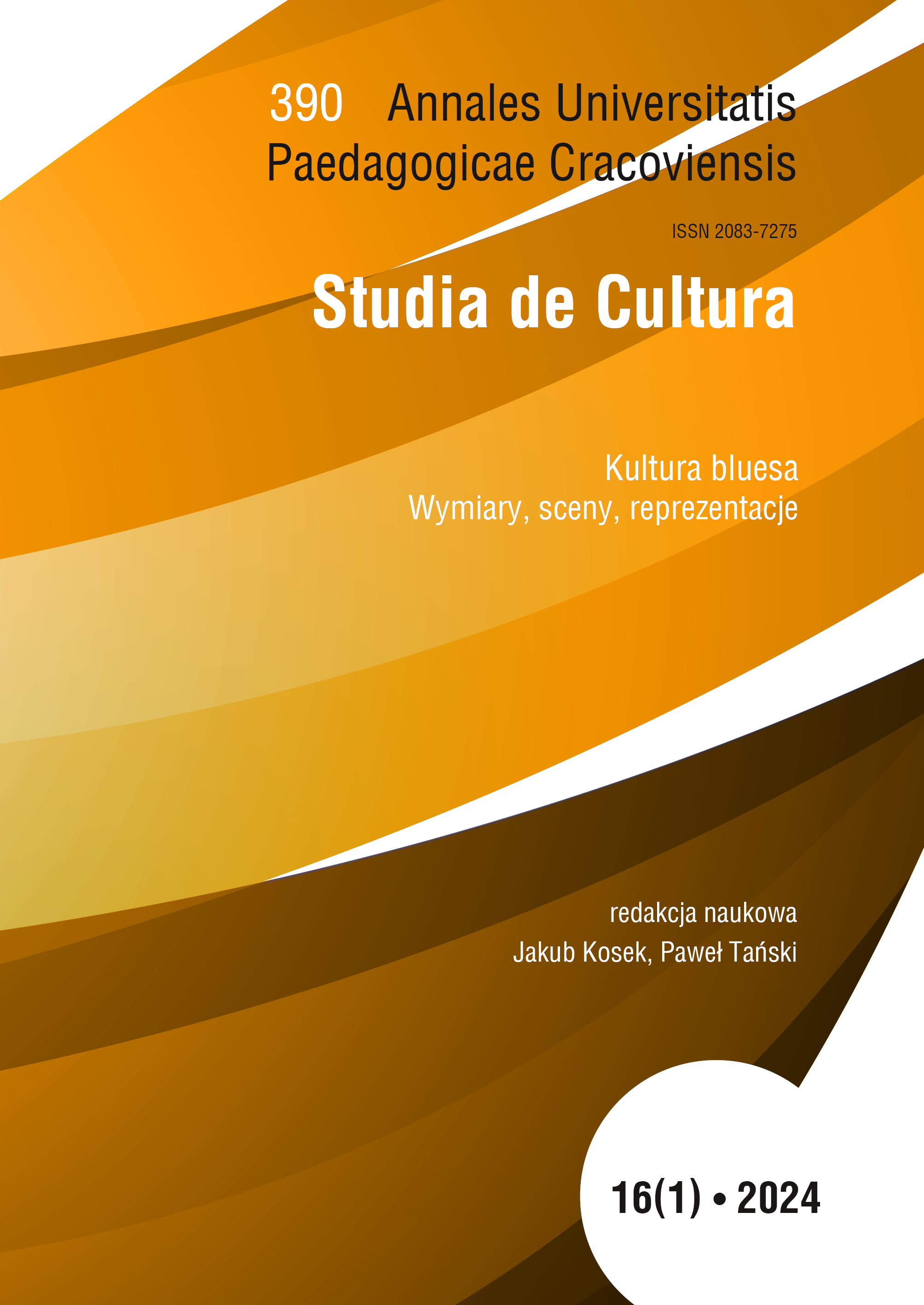Abstract
An indisputable feature of blues music is its religiosity and confessionality linked to the personal tone of lyrical expression. A confessional attitude is inscribed in the personal experience of the performative subject, which is expressed both in the textual layer and in the musical solutions correlated with it. Growing out of the “negro spiritual” tradition, the blues operates with an appropriate musical aesthetic: the lowered degrees of the blues scale correspond with complaint songs, expressing the pain of human existence. The spaces of expression outlined here include those where musical, existential, emotional, and personal expression meet in prayer, which is understood as a form of lyrical-musical expression. The analysis of two songs taken up in the article, Tadeusz Nalepa and Breakout’s The Prayer and Dżem’s The Prayer III, understands the works through genre consideration; it examines the communicative situation that is a result of adopted conventions and structures, specifically the three elements: invocation, petition, and “fruit” (fructus).
References
Ayxelà Carlos. 2020. „Muzyka, która pochodzi od Boga: śpiew i muzyka w liturgii”. Bronisław Jakubowski (przeł.). https://opusdei.org/pl-pl/article/muzyka-ktora-pochodzi-od-boga-spiew-i-muzyka-w-lit/ [dostęp: 14.02.2023].
View in Google Scholar
Baranowski Tomasz. 2004. „Kontemplacja, interpretacja, stylizacja. Refleksje o przemianach gatunku mszy w dziejach muzyki europejskiej”. Rocznik Teologii Katolickiej III. 95–104.
View in Google Scholar
Ekiert Janusz. 2006. „Blues”. W: Encyklopedia. Bliżej muzyki. Janusz Ekiert (red.). Warszawa. 54–55.
View in Google Scholar
Filipowicz Patryk. 2013. „Prawdziwość, autentyczność, bycie sobą – rozważania wokół problemu tożsamości na przykładzie twórczości artystów bluesowych”. Anthropos 20–21. 154–164.
View in Google Scholar
Grześkiewicz Ewelina. 2016. Modlitwa indywidualna w analizie genologicznej. Kraków.
View in Google Scholar
Dżem. Oficjalna strona zespołu. https://www.dzem.com.pl/historia.html [dostęp 14.02.2023].
View in Google Scholar
Loebl Bogdan. 2003. Blues. Warszawa.
View in Google Scholar
Makuchowska Marzena. 1998. Modlitwa jako gatunek języka religijnego. Opole.
View in Google Scholar
Matusiak Błażej. 2023. „Biblia w muzyce”. https://www.liturgia.pl/biblia-w-muzyce/ [dostęp 13.02.2023].
View in Google Scholar
Merecki Jarosław. 2006. „Jazz i duchowość”. Ethos 73–74. 292–302.
View in Google Scholar
Muzyka. Encyklopedia PWN. 2007. Sławomir Żurawski (red.). Warszawa 2007.
View in Google Scholar
Ożóg Zenon. 2007. Modlitwa w poezji współczesnej. Rzeszów.
View in Google Scholar
Skaradziński Jan, Wojciechowski Konrad. 2017. Piosenka musi posiadać tekst. I muzykę. Warszawa.
View in Google Scholar
Skwarczyńska Stefania. 1954. Wstęp do nauki o literaturze. T. 1. Warszawa.
View in Google Scholar
Słownik terminów literackich. 1989. Janusz Sławiński (red.). Wrocław.
View in Google Scholar
Spyra Piotr. 2016. „Religijne inspiracje w twórczości muzyków jazzowych”. Annales Universitatis Mariae Curie-Sklodowska XIV (2). 119–193.
View in Google Scholar
Waloszek Joachim. 1997. Teologia muzyki. Współczesna myśl teologiczna o muzyce. Opole.
View in Google Scholar
Węcławski Tomasz. 1995. Wspólny świat religii, Kraków.
View in Google Scholar
Wilk Wiesław. 1963. „Z tajników lirycznego dialogu z Bogiem”. Zeszyty Naukowe KUL VI (1). 47–60.
View in Google Scholar
Wojtak Magda. 1998. Czy można mówić o stylu człowieczej rozmowy z Bogiem?. W: Człowiek – dzieło – sacrum. Stanisław Gajda, Helmut Sobeczko (red.). Opole. 309–319.
View in Google Scholar
Wojtak Magda. 1999. Modlitwa ustalona – podstawowe wyznaczniki gatunku. W: W zwierciadle języka i kultury. Jan Adamowski, Stanisława Niebrzegowska (red.). Lublin. 129–138.
View in Google Scholar
Wojtowicz Marek. 2003. „Gdzie się podział Holy Blues”. Twój Blues 14. 50.
View in Google Scholar
Dżem. 1989. Najemnik. Atomica.
View in Google Scholar

This work is licensed under a Creative Commons Attribution-NonCommercial 4.0 International License.
Copyright (c) 2024 Annales Universitatis Paedagogicae Cracoviensis. Studia de Cultura

